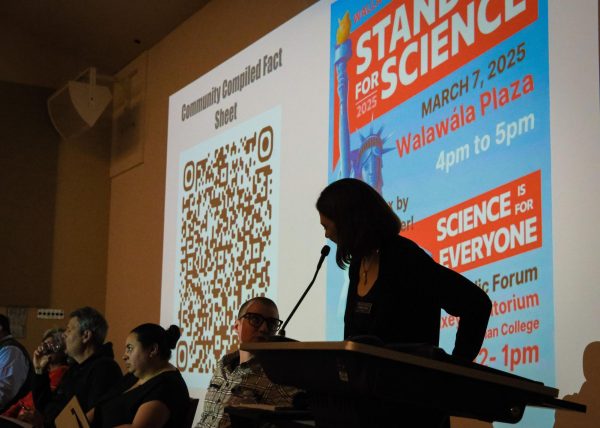
“Mad Scientists” took on a new meaning on Friday, March 7, 2025 as scientists across the country organized rallies as part of a national movement to “Stand Up For Science.” The day of action, which aimed to respond to President Trump’s high-profile budget cuts at the National Institutes of Health, National Science Foundation, Centers for Disease Control and Prevention, and more, drew thousands of participants in Washington, DC alone.
The National Stand Up for Science website describes its mission as calling on “policymakers, institutions, and the scientific community to uphold the integrity of science, protect its accessibility, and ensure its benefits serve all people.”
At Whitman, where faculty, students and staff participated in an early afternoon panel discussion that carefully sidestepped political questions, National Stand Up For Science day events received a muted response.
With roughly 150 attendees, Panelists Brit Moss (Associate Professor, BBMB), Rachna Sinnott (Director, Grants and Foundation Relations), Jason Pribilsky (Professor, Anthropology), Paula Perilla-Castillo (Visiting Assistant Professor, Geology and Environmental Studies), and Everett Maroon (Executive Director, Blue Mountain Heart to Heart) engaged in a discussion that broadly focused on the anticipated repercussions of the Trump administration’s budget cuts, while avoiding a more focused discussion on the political atmosphere behind the cuts.
Arielle Cooley, who organized the event along with Moss and Professor of Geology Kirsten Nicolaysen, explained why organizers chose to create what they described as an “educational event.”
“We are all educators, teaching is what I love, teaching is where my skill set is, and over the course of the conversation we moved towards doing a teaching event,” said Cooley.
For Moss, the event created the opportunity to educate people who may have been overwhelmed by a busy news cycle.
“It felt like there was an opportunity to just say, ‘hey, in case you hadn’t been aware of some of these proposed policy changes or policies being enacted, here’s what they are,’” said Moss.
At Whitman, where the school enjoys 501c3 status, political action can be seen as risky. Indeed, the college is one of 60 higher education institutions that recently received a letter from the Department of Education threatening to pull funding from schools that were hotbeds of political protest after October 9, 2023. The letter, alongside numerous executive orders from the Trump administration targeting students and policies in Higher Education, have created a chilling environment for free speech on campuses.
As the New York Times reported, several invited speakers at a Montana State University Stand Up for Science rally declined “for fear of repercussion from the state or federal government or their tenure committees.” International students were also too afraid to participate after “recent social media posts by Mr. Trump about cutting funding for universities allowing “illegal protests.””
These fears have made their way to Whitman, where faculty organizers were quick to clarify that this protest was organized in their personal, not professional, capacities.
“This is just three friends standing up to the excesses of the Trump administration. We are not doing this as STEM or as science at Whitman. We’re doing this as Arielle and Brit and Kirsten,” said Cooley.
Still, personal and professional status are not always easily delineated. For Nicolaysen, much of her career intertwined with her personal life, leading to a heightened sense of anger at the current cuts to science across the country.
“I’m feeling waves of grief. And one of the things that I am grieving is that I started in science when there were very few women in geoscience who were my direct mentors … I was very often placed in the position of being the only woman geoscientist in the room or the first woman geoscientist to do a particular type of expedition or lead an expedition,” said Nicolaysen, “after 30 plus years of that level of effort and quite frankly, sacrifice … there were many days when I chose Whitman students over my own kids.”
For Nicolaysen, as for scientists across the country, the matter is deeply personal.
“I resonate with their anxiety and I’m also like, how can we dismantle what helps produce resources, energy… the health of the environment, safety against hazards?” said Nicolaysen, “so, there’s grief and there’s deep compassion for my students.”




